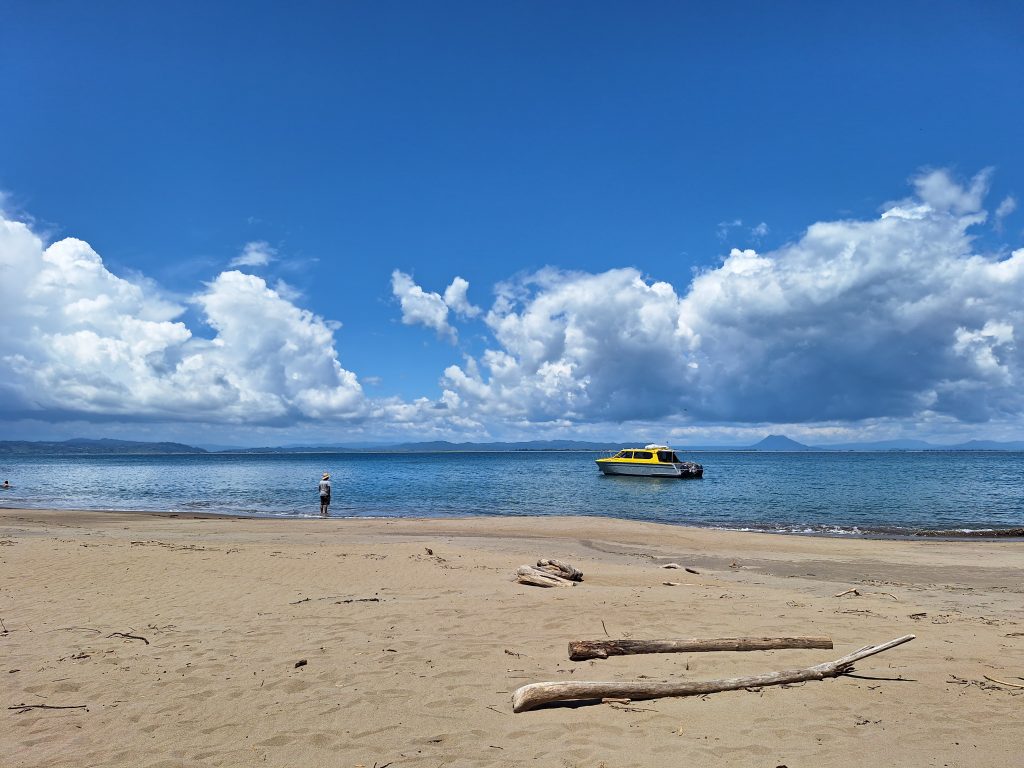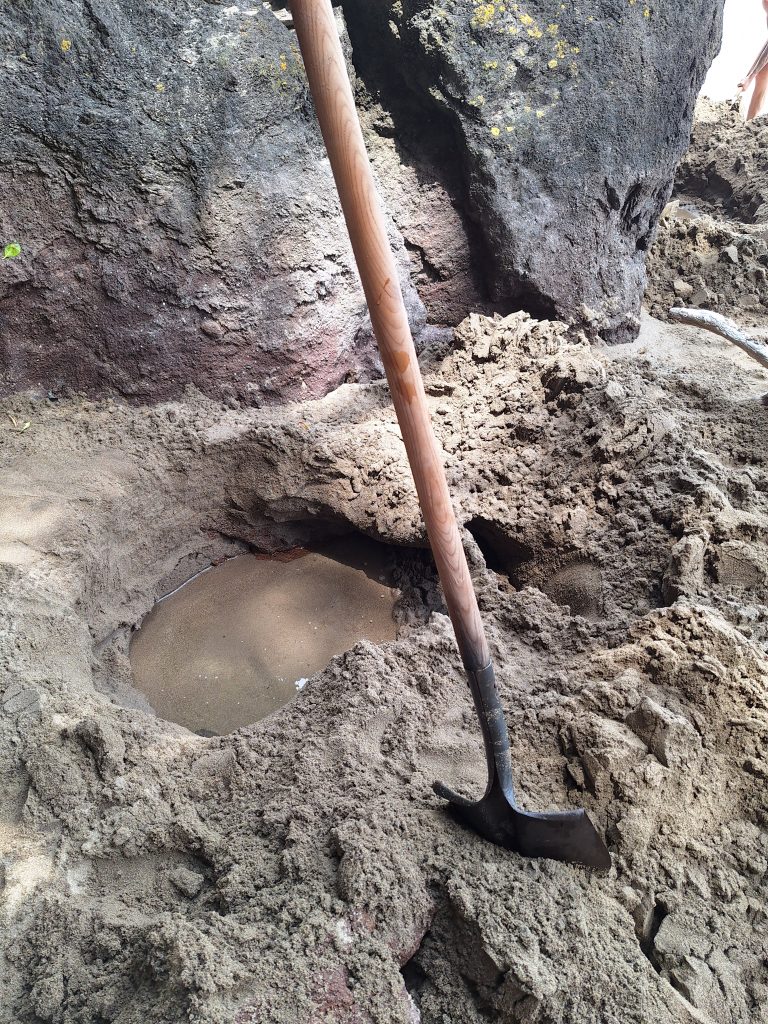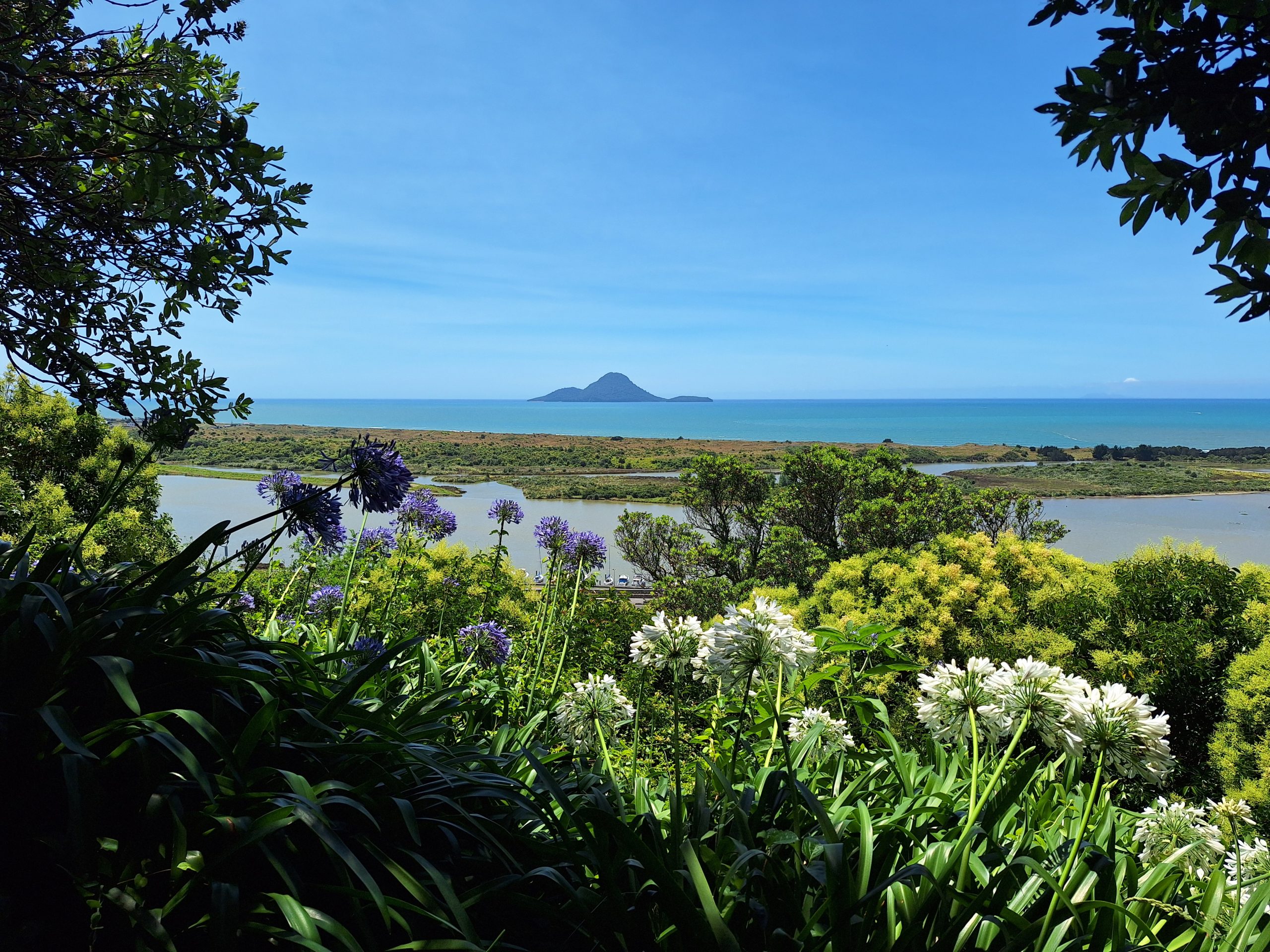A meditation on ecotourism, loneliness, and a holiday in Whakatāne that accidentally turned into a book review.

“Sometimes, a person reaches a point in their life when it becomes absolutely essential to get the fuck out of the city.”
This is the opening line of Becky Chambers’ cosy sci-fi novella A Psalm for the Wild-Built. The book follows a monk called Sibling Dex, who feels compelled to leave their comfortable life and get out into nature.
I understand that restlessness deep in my body. It’s the feeling of being sick with Covid and stuck in bed for months. It’s the feeling of dragging myself to work, part-time, because I absolutely need money to pay my bills. It’s the increased work stress that needs more done with less, and even more with even less. It’s crying on the bus every morning, getting to work, washing my face, and feeling the tears well up as soon as anyone speaks to me. The shame that accompanies being so visibly vulnerable. The too-muchness of it all, with never enough energy to get on top of the dishes, the laundry, the vacuuming, the cooking.
And then up comes Christmas. I’m Canadian. Southern Hemisphere holidays are discombobulating for me, but most especially Christmas. Back in Canada, I didn’t particularly celebrate the holiday once I grew up and left home. But friends would be around, and I could walk around in the snowy dark to marvel at the Christmas lights.
In Dunedin, the city empties over the summer holidays. The students are gone, and everyone else seems to vanish off travelling. There are community events, but the bus service doesn’t run, so I’m a bit stuck. In 2023 I house-sat for a friend. It started great, it was nice to be in a different space. I planned some nice meals and some treats. I wound up face-down on the floor.
In A Psalm for the Wild-Built, it’s easy for Sibling Dex to change their vocation. They decide to become a tea monk, travelling around on an eco-friendly bike-wagon, listening to people’s problems and serving them a cuppa. The other monks happily provide all the materials needed for Dex to get out and address their spiritual yearning to hear crickets.
It’s less easy to change jobs in this reality, this economy. But I could take Christmas back into my own hands. I needed novelty, fresh air, warmth, a place to swim, people to see, something to look forward to.
So I planned a trip to Whakatāne.
Why Whakatāne, you ask? Don’t worry, you aren’t the first. No, I don’t know anyone in Whakatāne; zero connection to the place.
Here’s the complex calculus of choosing my destination:
I don’t want to drive. I can, I have a full license, but I don’t. So I need to fly in, get transport from the airport, and then either walk or bus around. Rural Otago is out.
I also need celiac-friendly food.
Are there any nature-related day trips I can enjoy, given the no-car situation? For me, checking out local flora and fauna is a huge part of a good trip, especially when trying to feel grounded and good in my skin.
Accommodation. My disability (I have an acquired brain injury) means I need to spend a lot of time recharging.
Budget. I don’t have a lot of money. I’m willing to blow most of my savings to get the fuck out of the city, but that doesn’t stretch far. So, affordable, comfortable and quiet.
Outdoor swimming spots. While this was less of a deciding factor, it was certainly something I looked into.

It turns out Whakatāne ticks all the boxes. There’s an airport nearby, and a taxi service. The city is walkable. I reserved a private cabin at the Awa Motel. And through the motel, you can book a daytrip to Moutohorā Island, a rewilded ecosanctuary.
Now you see where the bit about ecotourism comes in.
In this climate crisis, I find it hard not to be concerned with the environmental impact of travel. From the carbon cost of flying to the impact of foot traffic, I worry about my toll, and our collective toll, on the ecology.
This is a theme that comes up in A Psalm for the Wild-Built. As Dex becomes a well-practiced tea monk, they start to feel restless again. They impulsively leave their route and enter the forest, a place that has been intentionally returned to the wild, and where few venture. There is an old trail, but it’s crumbled and not maintained. And in the forest, Dex encounters a robot.
In this story, robots have become sentient and left humanity to live wild and free while humans sorted themselves out (which they have—it’s a solarpunk book, which means it takes place in a future where humanity lives in harmony with nature). There has been no contact in 200 years. This robot, named Mosscap, has come to ask the question ‘what do humans need?’ Mosscap decides to accompany Dex in the wilderness, and when they return, Dex will be the robot’s guide to humanity.
There’s a moment where Dex goes to step off the trail. They need water, and there’s a nearby stream. But Dex worries about their impact; after all, humans set aside wild areas specifically because of the catastrophic damage they had caused. Mosscap points out that a single human will cause less of a disturbance than, say, an elk. And besides, Dex needs water, and that requires leaving the trail.
I agree with the book’s framing that humankind ought to limit our footprint. Sometimes that leaves me feeling guilty about going anywhere, but I don’t think that’s right either. We’re part of the ecology, not separate from it. I strongly believe (and science confirms; see: forest-bathing) that getting out into nature is good for us mammals. We have to sometimes step off the track. It’s finding the balance against carelessness or overuse. For all the folks who carry out their own mess and don’t trample the flowers, there are others who pay no mind. I’m reminded of the farmers who had their sunflower crops ruined because of an influencer fad. One or two visitors wouldn’t have made an appreciable difference; dozens or hundreds, and there’s wreckage. And we’ve all seen the mud and trash left after outdoor festivals.
Ecotourism is supposed to help by facilitating sustainable visits to natural places. I treasure the opportunity to see the taonga species of Aotearoa. Moutohorā is home to tīeke, kākāriki, geckos and even tuatara. It also has a thermal beach.
Green-washing (businesses who claim to be eco-friendly, but aren’t) is a significant issue, so I did some research. The Moutohorā Island tour has an accreditation affirming its adherence to environmental criteria, including energy management, waste and pollution management and restoring nature. The ticket price includes a Department of Conservation landing fee, as well as a contribution to the Whakatāne Coastguard. This reassures me that resources are being allocated to the right places for sustainability.
The tour company (along with Awa Motel) is owned by Ngāti Awa Group Holdings, meaning that it’s a choice that supports iwi-run business. Staying at the motel, I felt the manaakitanga. From the offer of an electric frying pan upon arrival because I was there for an extended stay over Christmas, to the little plate of goodies and a Christmas card in my room, moments of kindness made me feel noticed.
I think a lot of loneliness comes down to feeling invisible. Everyone experiences it at some point. When I was sick, alone, and finding it hard to draw breath, I found myself thinking if I die, how long will it take someone to find my body?
And so to sit on the porch of my room in Whakatāne, listening to the myna birds while drinking coffee and chatting with a passing staff member, brightens things. As Sibling Dex would say, praise to Allalae, the God of Small Comforts.
On the tour, the guides made a point of chatting with everyone. They were charismatic and welcoming. One very quickly started to call me ‘Ōtepoti,’ because Dunedin is my frame of reference for everywhere else in New Zealand. Have I mentioned Whakatāne is only the second North Island city I’ve been to? (The other is Auckland.)
I’m a keener on tours. I like to be close to the guide and learn all the things. I was told, once, that it was obnoxious, and I’ve been self-conscious about it ever since. And yet I can’t stop myself from getting right in there, listening intently and asking questions.
After the nine-kilometre boat ride—on a gorgeous sunny day, no less—we split into two groups to be guided around the island. My group began by picking up some dry cabbage tree / tī kōuka leaves and learning how to braid them into bracelets. It was neat how much time was spent talking about the botany, something I think can get overlooked when there are charismatic creatures around. We saw plenty of geckos living in the rat traps, which they far prefer to the purpose-built stone hideouts they were supposed to move into. The tuatara didn’t come out, but we did see tīeke and kākāriki. I learned about which kawakawa leaves to forage, and that chewing them is useful for toothache—and also that kawakawa is a laxative. Useful knowledge.

There is a page in A Psalm for the Wild-Built that I have dog-earned, containing a passage that I have underlined over and over: “…it is enough to exist in the world and marvel at it. You don’t need to justify that, or earn it. You are allowed to just live.”
Next to it, I wrote “the world’s hardest thing.”
But in that brief visit to Whakatāne it wasn’t. In fact, it was easy.
Until we got to the beach, I had only really talked to the guides. Then we arrived at Onepū (Sulphur Bay). There, the group was invited to dig hot pools in the sand—but there were only two shovels. Suddenly, just like kids at summer camp, we were bonding. Everyone was chatting and laughing as we took turns with the shovels and swimming in the ocean. The tide was wrong for making hot pools, as it turned out, so it took a lot of digging. It was Christmas Eve and a group of strangers were playing in the mud. The perfect antidote to loneliness.
Words & Photos: Claire Lacey

